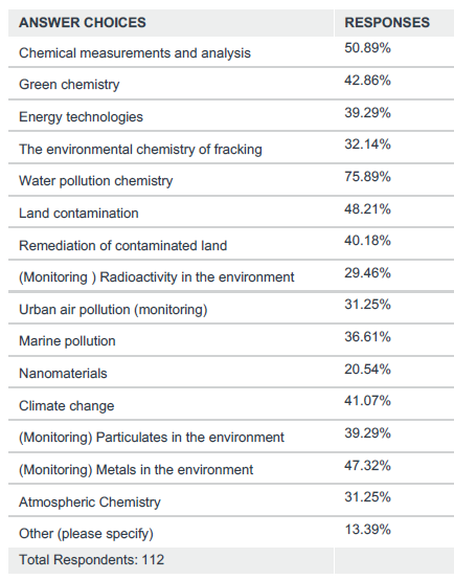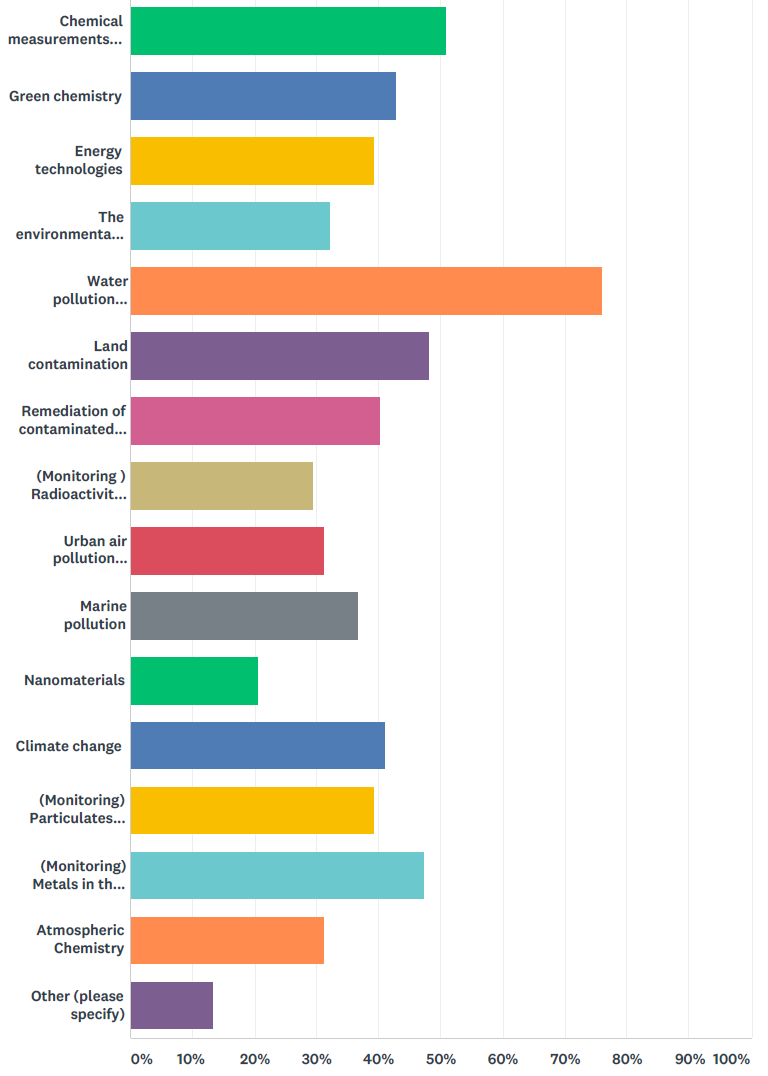RSC ECG Continuing Professional Development (CPD) survey
ECG Bulletin January 2019
Earlier this year we sent a survey out to Environmental Chemistry Group members to gauge their interest in continuing professional development (CPD) resources. We asked how much CPD training they currently undertake, and whether and to what extent they would like support from the Environmental Chemistry group in this area.
As scientific professionals, we understand the importance of engaging in continuing professional development throughout our career. It incentivises us to engage in lifelong learning and helps us mature into ever more competent professionals, equipped to apply new knowledge, skills and expertise to our work. Undertaking CPD, and being seen so to do, sets an example to professional colleagues and encourages them to do likewise – a virtuous circle.
As a consequence, many professional bodies, including the RSC, require individuals who have achieved chartered status to make a commitment to continuing their professional development as a condition of retaining their chartered designation. In most cases, this means keeping an activity record together with reflective statements about how, and in what way, that element of CPD has benefitted you. Importantly, CPD records often include statements about how the professional will make use of their new insights or knowledge and in the betterment of their work, betterment of their colleagues and advancement of their professional community. An individual’s CPD record is sometimes called in for audit by the professional body to make sure that it aligns with their requirements and to provide feedback to ensure that it represents a useful resource to the author and a valuable record of progress over time.
As a consequence, many professional bodies, including the RSC, require individuals who have achieved chartered status to make a commitment to continuing their professional development as a condition of retaining their chartered designation. In most cases, this means keeping an activity record together with reflective statements about how, and in what way, that element of CPD has benefitted you. Importantly, CPD records often include statements about how the professional will make use of their new insights or knowledge and in the betterment of their work, betterment of their colleagues and advancement of their professional community. An individual’s CPD record is sometimes called in for audit by the professional body to make sure that it aligns with their requirements and to provide feedback to ensure that it represents a useful resource to the author and a valuable record of progress over time.
Question 12 responses. Raw data. Are there any subject areas that ECG might offer or compile that would be of particular interest to you for your CPD? 112 answers, 56 skips.
The RSC has its own designated chartered status – the Chartered Chemist. It also holds licences to award Chartered Scientist and Chartered Environmentalist. Maintaining a CPD record is a requirement for each of these to enable you to maintain chartered professional status. There are also Registered Scientist and Registered Science Technician Designations with similar requirements.
Returning to our survey, we received over 150 respondents to the survey of whom nearly two thirds already hold one or more charterships. Of those who are not chartered, half were hoping to achieve chartered status within the next three years. As such, CPD was a key concern to a large portion of survey respondents. Half of our respondents currently perform some form of CPD, the most popular resources being webinars, conferences, online articles and papers, and other forms of private study, with online articles deemed the most beneficial resource. A further third of respondents who don't currently undertake any form of CPD, have indicated that they would like to do so.
The overwhelming majority of respondents told us that they would like us to signpost them to CPD resources and to provide our own. The main barriers to members accessing CPD were cost, time, distance, and knowing where to find resources. As a first step, the ECG Committee is investigating ways to signpost useful online content to members, but we are also starting to plan some trial webinars for 2019. The topic of most interest to members was water pollution chemistry, with other topics such as land contamination and pollution measurement and analysis also attracting significant interest. This information will inform the subjects of our initial webinars, although we are open to further suggestions. Details of webinars will be distributed once details have been established.
According to our survey, Massive Open Online Courses (MOOCs) are not currently used by many of our members. These courses are often free to access (although many do offer a certified course for a small fee) and are often a useful way of gaining an introduction to a new topic. A number of platforms host MOOCs; the best known providers are edX (www.edx.org), Coursera (www.coursera.org) and FutureLearn (www.futurelearn.com).
Some of the courses have defined start dates, whilst others are self-paced. Most have online assessments; those that have defined start dates also usually have online moderated discussion forums. All include a course length, suggested study hours per week and a syllabus in their advertisements. Wageningen University, for example, offer courses relating to fossil fuels and biorefineries through edX, whilst Coursera hosts a very popular Pennsylvania State course ‘Creativity, Innovation and Change’. Other interesting courses offered online for free through the three sites mentioned previously include ‘Making Sense of Climate Change Denial and Energy 101’, ‘Blockchain in the Energy Sector’, and ‘Citizen Science, From Data to Action’.
Additional Resources
For those looking for further resources, remember that the Chemistry World website (www.chemistryworld.com) also has some on-demand webinars whilst the RSC has its own YouTube channel (click here) which includes some short videos for use in education and outreach as well as the longer ChemCareers webinars available to watch on demand. There are also RSC webinars hosted by the RSC Consulting Group.
Returning to our survey, we received over 150 respondents to the survey of whom nearly two thirds already hold one or more charterships. Of those who are not chartered, half were hoping to achieve chartered status within the next three years. As such, CPD was a key concern to a large portion of survey respondents. Half of our respondents currently perform some form of CPD, the most popular resources being webinars, conferences, online articles and papers, and other forms of private study, with online articles deemed the most beneficial resource. A further third of respondents who don't currently undertake any form of CPD, have indicated that they would like to do so.
The overwhelming majority of respondents told us that they would like us to signpost them to CPD resources and to provide our own. The main barriers to members accessing CPD were cost, time, distance, and knowing where to find resources. As a first step, the ECG Committee is investigating ways to signpost useful online content to members, but we are also starting to plan some trial webinars for 2019. The topic of most interest to members was water pollution chemistry, with other topics such as land contamination and pollution measurement and analysis also attracting significant interest. This information will inform the subjects of our initial webinars, although we are open to further suggestions. Details of webinars will be distributed once details have been established.
According to our survey, Massive Open Online Courses (MOOCs) are not currently used by many of our members. These courses are often free to access (although many do offer a certified course for a small fee) and are often a useful way of gaining an introduction to a new topic. A number of platforms host MOOCs; the best known providers are edX (www.edx.org), Coursera (www.coursera.org) and FutureLearn (www.futurelearn.com).
Some of the courses have defined start dates, whilst others are self-paced. Most have online assessments; those that have defined start dates also usually have online moderated discussion forums. All include a course length, suggested study hours per week and a syllabus in their advertisements. Wageningen University, for example, offer courses relating to fossil fuels and biorefineries through edX, whilst Coursera hosts a very popular Pennsylvania State course ‘Creativity, Innovation and Change’. Other interesting courses offered online for free through the three sites mentioned previously include ‘Making Sense of Climate Change Denial and Energy 101’, ‘Blockchain in the Energy Sector’, and ‘Citizen Science, From Data to Action’.
Additional Resources
For those looking for further resources, remember that the Chemistry World website (www.chemistryworld.com) also has some on-demand webinars whilst the RSC has its own YouTube channel (click here) which includes some short videos for use in education and outreach as well as the longer ChemCareers webinars available to watch on demand. There are also RSC webinars hosted by the RSC Consulting Group.



